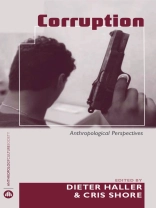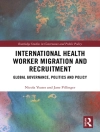Corruption in politics and business is, after war, perhaps the greatest threat to democracy. Academic studies of corruption tend to come from the field of International Relations, analysing systems of formal rules and institutions. This book offers a radically different perspective – it shows how anthropology can throw light on aspects of corruption that remain unexamined in international relations.
The contributors reveal how corruption operates through informal rules, personal connections and the wider social contexts that govern everyday practices. They argue that patterns of corruption are part of the fabric of everyday life – wherever we live – and subsequently they are often endemic in our key institutions.
The book examines corruption across a range of different contexts from transitional societies such as post-Soviet Russia and Romania, to efforts to reform or regulate institutions that are perceived to be potentially corrupt, such as the European Commission. The book also covers the Enron and World Com scandals, the mafia in Sicily and the USA, and the world of anti-corruption as represented by NGOs like Transparency International.
قائمة المحتويات
1. Sharp Practice: Anthropology and the Study of Corruption by Cris Shore and Dieter Haer
Part I. Corruption in ‘Transitional’ Societies
2. The Intersection of Political Corruption and Organized Crime: A Comparison of Palermo, Italy and Youngstown, Ohio.
3. Bribes, Gifts, and Unofficial Payments: Towards an Anthropology of Corruption in Post-Soviet Russia by Michele Rivkin-Fish
4. Corruption as a Transitional Phenomenon: Understanding Endemic Corruption by David Lovell
5. Corruption, Property Restitution, and Romanianness by Filippo M. Zerilli
Part II. Institutionalised Corruption and Institutions of Anti-Corruption
6. Integrity Warriors: Global Morality and the Anticorruption Movement in the Balkans by Steven Sampson
7. Culture and Corruption in the EU: reflections on Fraud, Nepotism and Cronyism in the European Commission by Cris Shore
8. Corruption in Corporate America: Enron – Before and After by Carol Mac Lennan
Part III. Narratives and Practices of Everyday of Corruption
9. Narrating the State of Corruption by Akhil Gupta
10.‘Where the Jeeps Come From: Narrations on Corruption in the Alentejo (Southern Portugal) by Dorle Drackle,
11. Citizens despite the State: Everyday corruption and local politics in El Alto, Bolivia by Sian Lazar
12. Afterword: Anthropology and Corruption: the State of the Art by Dorothy Louise Zinn
Notes on Contributors
Index
عن المؤلف
Cris Shore is Professor of Social Anthropology at the University of Auckland. His most recent publications include, Up Close and Personal (Berghahn, 2013), The Sage Handbook of Social Anthropology (Sage, 2012) and Corruption (Pluto, 2005).












